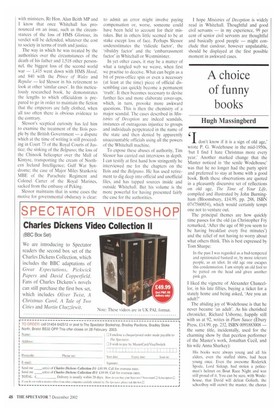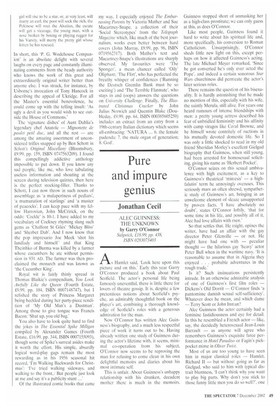A choice of funny books
Hugh Massingberd
Idon't know if it is a sign of old age,' wrote P. G. Wodehouse in the mid-1950s, 'but I find I hate Christmas more every year.' Another marked change that the Master noticed in 'the senile Wodehouse' was that he no longer had the party spirit and preferred to stay at home with a good book. Both these observations are quoted in a pleasantly discursive set of reflections on old age, The Time of Your Life, compiled and illustrated by John Burningham (Bloomsbury, £14.99, pp. 288, ISBN 0747560854), which would certainly tempt one not to venture out.
The principal themes are how quickly time passes for the old (as Christopher Fry remarked, 'After the age of 80 you seem to be having breakfast every five minutes') and the relief of not having to worry about what others think. This is best expressed by Tom Sharpe:
In the past I was regarded as a bad-tempered and opinionated bastard or, by more tolerant people, as an idiot. In old age one escapes this condemnation. I am simply an old fool to be patted on the head and given another pink gin.
I liked the vignette of Alexander Chancellor, in his late fifties, buying a ticket for a stately home and being asked, 'Are you an adult?'
The abiding joy of Wodehouse is that he never became 'an adult'. As his cherished chronicler, Richard Usborne, happily still with us at 92, writes in Plum Sauce (Ebury Press, £14.99, pp. 232, ISBN 0091883008 — the same title, incidentally, used for the charming show by that peerless performer of the Master's work, Jonathan Cecil, and his wife Anna Sharkey):
His books were always young and all his elders, even the stuffed shirts, had been young once. Even the awesome Roderick Spode, Lord Sidcup, had stolen a policeman's helmet on Boat Race Night and was still proud of it. You can be sure, with Wodehouse, that David will defeat Goliath, the schoolboy will outwit the master, the chorus girl will rise to he a star, or, at very least, will marry an earl, the poor will sock the rich, the Pekinese will rout the Alsatian, the curate will vet a vicarage, the young man, with a nose broken by boxing or playing rugger for his Varsity, will marry the pretty girl whose kitten he has rescued.
In short, this 'P. G. Wodehouse Companion' is an absolute delight with several laughs on every page and constantly illuminating comments from the beady authority who knows the work of this great and extraordinarily original writer better than anyone else, I was struck, for instance, by Usborne's invocation of Tony Hancock in describing the appeal of Ukridge. For all the Master's essential benevolence, he could come up with the telling insult: 'As ugly a devil as you would wish to see outside the House of Commons.'
The 'signature dishes' of Aunt Dahlia's legendary chef Anatole — Mignonette de pouter peril duc, and all the rest — are among the amazing assortment of unconsidered trifles snapped up by Ben Schott in Schott's Original Miscellany (Bloomsbury, £9.99, pp. 159, ISBN 0747563209). I found this compellingly addictive anthology impossible to put down. If you know any sad people, like me, who love tabulating useless information and shouting at the screen during television quizzes, then here is the perfect stocking-filler. Thanks to Schott, I can now throw in such nouns of assemblage as 'a malapertness of pedlars', 'a mumuration of starlings' and 'a muster of peacocks'. I can keep pace with my fellow Harrovian, John McCririck, on the odds: 'Cockle' is 10-1. I have added to my vocabulary of Cockney rhyming slang such gems as 'Chalfont St Giles' Mickey Bliss' and 'Sherbet Dab'. And I now know that the pop impresario Joe Meek 'shot his landlady and himself' and that King Theinhko of Burma was killed by a farmer whose cucumbers he ate without permission in 931 AD. The farmer was then proclaimed the monarch and was known as 'the Cucumber King',
Royal wit is fairly thinly spread in Thomas Blaikie's compendium, You Look Am.:hilly Like the Queen (Fourth Estate, £9.99, pp. 104, ISBN 0007148747), but I relished the story of Princess Margaret being heckled during her party-piece rendition of 'My Old Man's a Dustman'. Among those to give tongue was Francis Bacon: 'Shut up, you old bag.'
You also have to look quite hard to find the jokes in The Essential Spike Milligan compiled by Alexander Games (Fourth Estate, £16.99, pp. 344, ISBN 0007155093), though some of Spike's surreal asides make it worth the effort. His simple, absurdly logical word-play gags remain the most rewarding as in his 1956 seasonal hit record, 'I'm Walking Backwards for Christmas': 'I've tried walking sideways, and walking to the front./ But people just look at me and say its a publicity stunt ...'
Of the illustrated comic books that came
my way. I especially enjoyed The Embarrassing Parents by Victoria Mather and Sue Macartney-Snape. a collection of their 'Social Stereotypes' from the Telegraph Magazine which, like much of the best journalism, works even better between hard covers (John Murray, £9.99, pp. 96, ISBN 0719562317). Both Mather's text and Macartney-Snape's illustrations are sharply observed. My favourites were 'The Sponger', a mean chancer called 'Oily' Oliphant; 'The Flirt', who has perfected the breathy whisper of confidences ('Running the Deutsch Gremlin Bank must be so exciting') and 'The Terrible Flatmate', who stays in and (oops) answers the questions on University Challenge. Finally, The Illustrated Christmas Cracker by John Julius Norwich and Quentin Blake (Doubleday, £9.99, pp. 64, ISBN 000385605250) includes an extract from an entry from a 19th-century Italian dictionary which seems all-embracing: 'NATURA ... 6. the female pudenda: 7. the male organ of generation; 8. God'.











































































 Previous page
Previous page